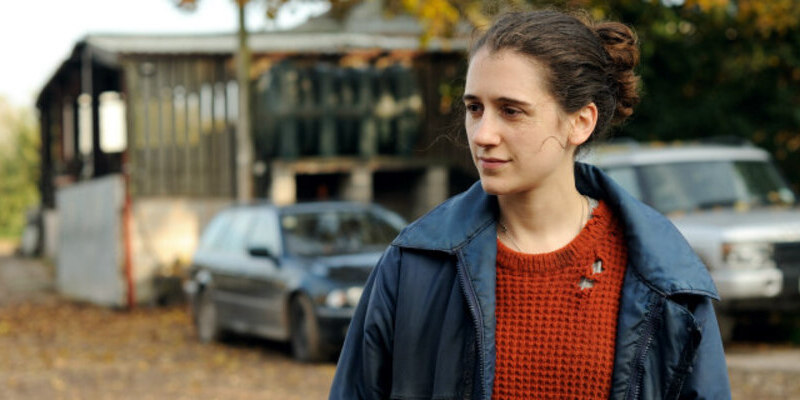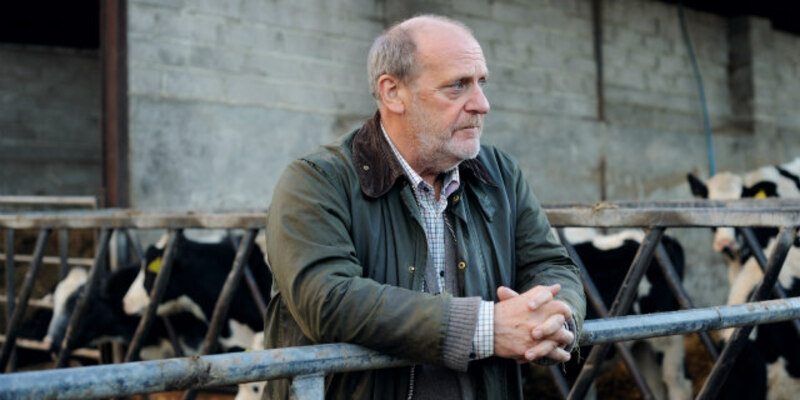
Following a personal and environmental tragedy, a young woman returns to
her family farm.
Review by Benjamin Poole
Review by Benjamin Poole
Directed by: Hope Dickson Leach
Starring: Ellie Kendrick, David Troughton, Jack Holden, Joe
Blakemore

Hope Dickson Leach’s pastoral drama
The Levelling opens with a firework montage of pagan energy.
In rapid transitions we see ribald young men, naked save for the gym socks
wrapped about their penises, drink and fight and dance about the hot
tangerine flames of a bonfire; fingers are forebodingly plunged into churned
sod, semen hits the screen, and the sound bridges from revelry to violence,
as all the while a hare watches, the urgent carousing reflected in her
patient and ominous glare.

In contrast to its strange and vibrant preface, The Levelling’s narrative proper is a sombre, meditative affair. It’s a hangover of a
movie, one that regretfully pieces together the events that fatefully led up
to the night depicted in the prologue, an evening which ended in the suicide
of one character. In a similarly reflective manner,
The Levelling is also in its own small way a ‘post-disaster’
movie; the action takes place within a farm in the south of England, six
months after floods have devastated the area, picking up on the lasting
effects of the disaster, rather than the spectacle itself. The farm has been
rendered destitute, barely held together by patriarch Aubrey (David Troughton) and local James (Jack Holden), a grim set of circumstances which
the estranged Clover (Ellie Kendrick) discovers when she returns home
for the funeral of her brother (Harry, who shot himself during the party).
When a family friend drops Clover off at the dilapidated homestead, he makes
the usual "if there’s anything I can do" noises, to which Clover snaps,
"Could you make it my dad that died, and not my brother?" - ooof! It doesn’t
seem as if anyone is about to kill the fatted calf upon Clover’s return: for
one thing, they can barely afford to lose the asset.

From the uncomfortably tight edits of the opening close-ups,
The Levelling’s mise-en-scene opens up to beautifully bleak shots of the flat
countryside, wide angle shots that seem to hold an infinite sadness, one
that has been allowed to stretch as far as the horizon itself; as damaging
to the environment as the floods whose sheen of stagnant water the plains
still bear. The farm itself is pitiless, a tableau that Leach paints in
rough hues of mud, blood, metal and sweat. The tone is set when one of the
first things we see on the farm is a septic tank wherein the carcass of some
wretched animal rots and ferments: fair play to Leach, there is no shying
away from the brutal business of farming here. As the film unfolds, calves
are shot for being the wrong gender, a mass grave of badgers is literally
unearthed, and a dog (Mylo - my favourite character) almost drowns: the
lives of these poor little souls (and, it transpires, the suicidal Harry)
dependent on a merciless market economy (weirdly, this is the second film in
as many weeks I’ve seen where the actors milk a cow - beat that, Pauline
Kael!). Not to make light of the issue but I’d probably kill myself too if I
had to live there, and, as if to emphasise the point, there is a visual
motif of actual shit that runs through the movie; shit scraped off floor and
boots, shit piling up in an outhouse where Mylo has been abandoned, shit in
a toilet that doesn’t flush…

Leach weaves similarly bellicose visual metaphors throughout the film,
mainly in the shape of non-causal scenes of animals traversing water, such
as an otter diving and ascending in slow motion, or a herd of cows splashing
through. The meaning is clear: nature, red in tooth and claw, has primacy
here, as demonstrated by the floods and the animal nature of life on the
farm. However, while this handsomely filmed production is an achievement in
grim spectacle, the style, pristine as it is, at times prevents us from
fully investing in the drama, rendering the action cold and remote. We never
feel heartbroken, or, despite Kendrick’s game performance at the centre of
the film, able to relate to the characters. Everything, from the score, to
the dark lighting and iconography of dead animals, is an omen, a portent of
doom. As the prodigal son narrative reaches a conclusion which is as
inevitable as death itself on the farmstead, and a garden of Eden is
seemingly lost forever, we’re left with a lasting oppression, a bleakness
that bludgeons rather than a sincere emotional resonance. You’re left
thinking that perhaps the badgers, the calves and the cows who perished
instantly at the trigger of Aubrey’s gun, and thus got out quickly, were the
lucky ones.

The Levelling is on MUBI UK
now.
